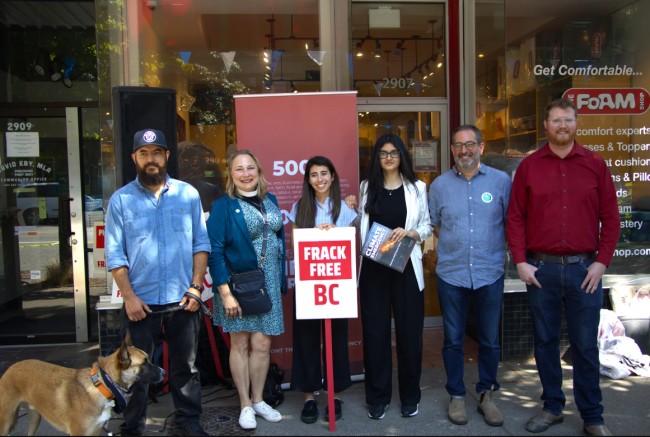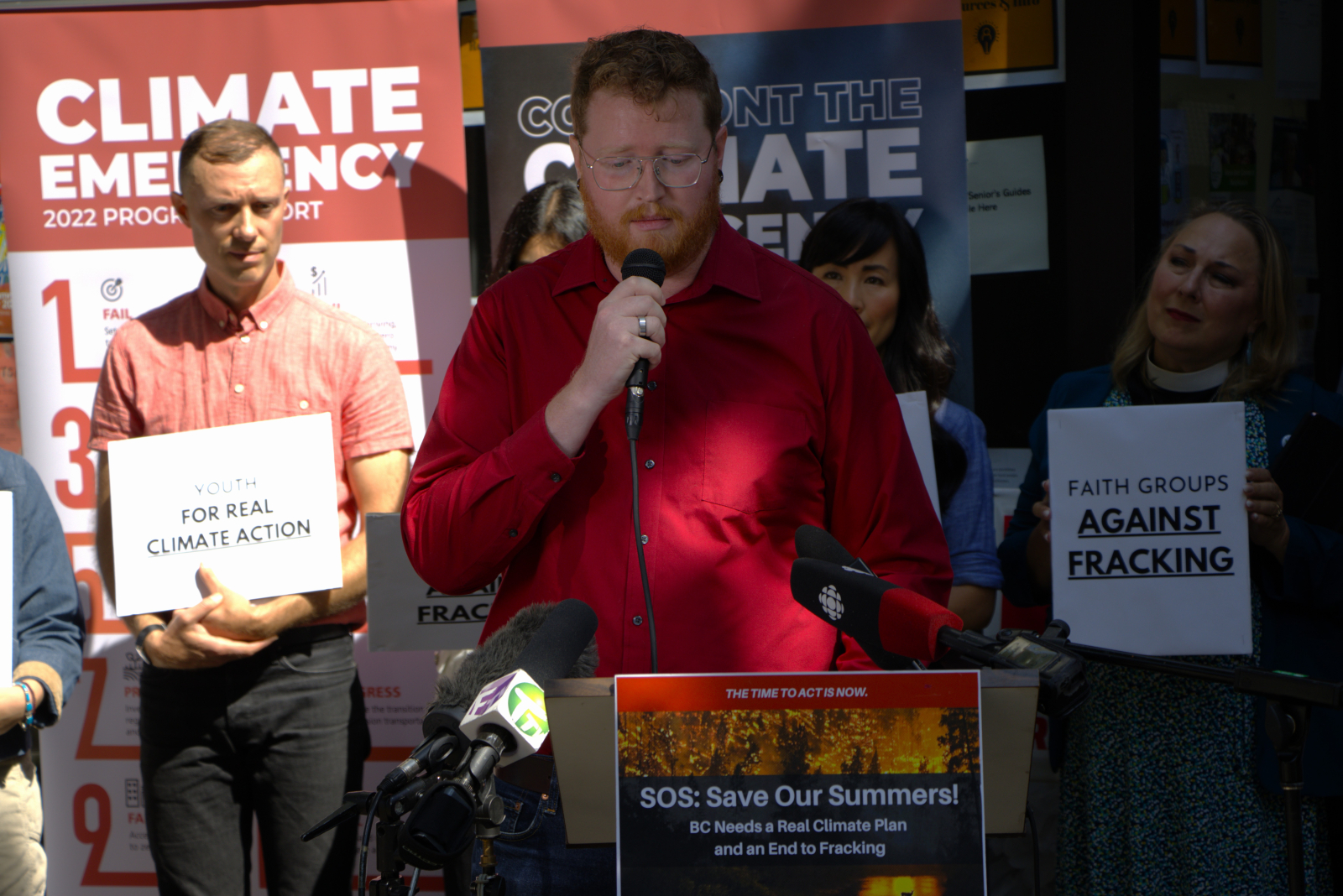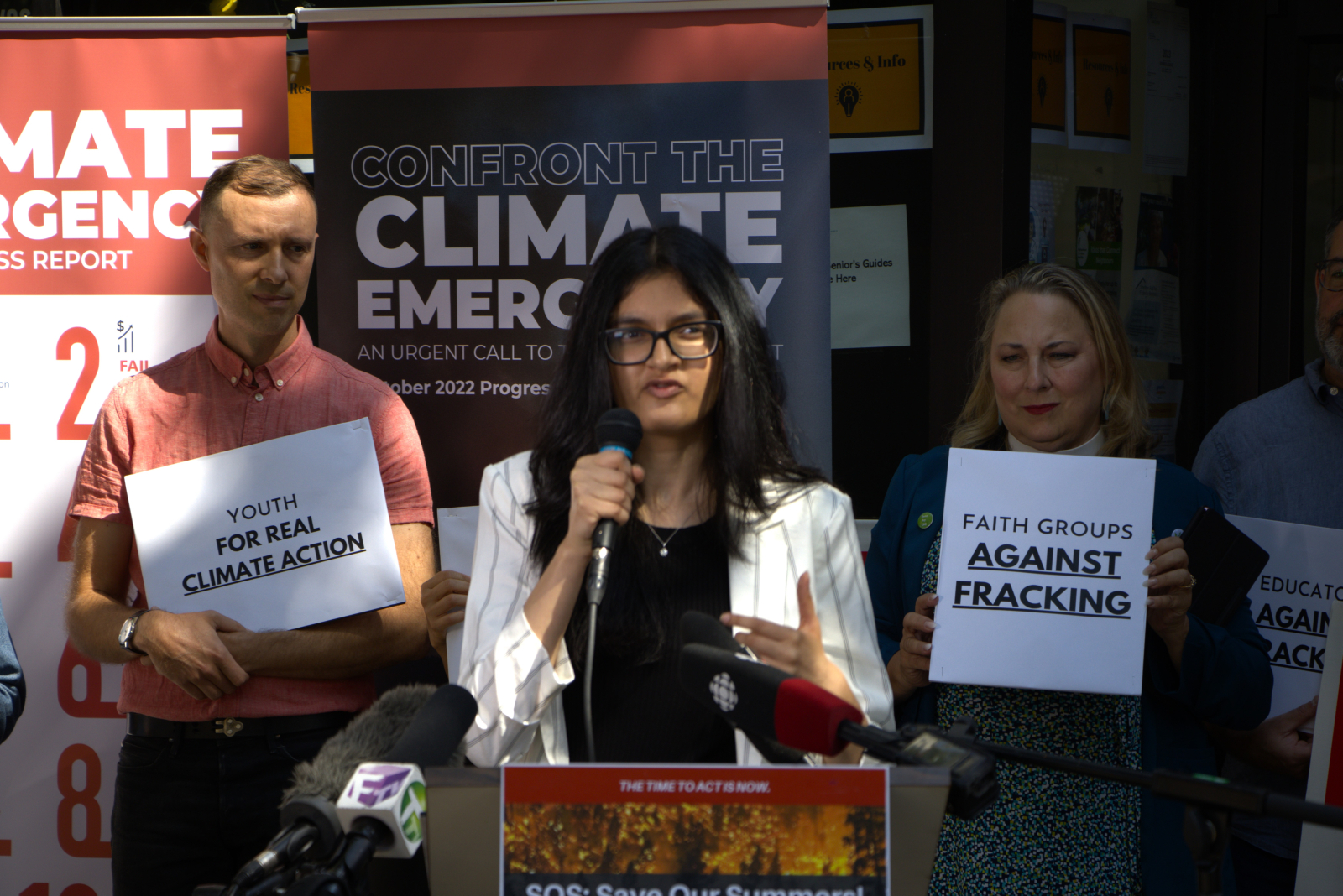Articles Menu

June 29, 2023
On the two-year anniversary of a heat dome that killed 619 people, environmental advocates issued a plea to B.C. Premier David Eby to slash greenhouse gas emissions in line with climate targets the province has set for the end of the decade.
The B.C. Climate Emergency Campaign (BCCEC) and Frack Free B.C. led a press conference titled, “Save our Summers,” which took place outside the premier’s constituency office on Musqueam, Squamish and Tsleil-Waututh territory. In recent summers, B.C. communities have been devastated by extreme heat, drought, wildfire and poor air quality, putting strain on the health-care system and costing the B.C. government billions of dollars.
“Usually, this is a time of celebration, as we set off to enjoy the summer, spend time outdoors and relax with friends and family,” said BCCEC co-ordinator Emiko Newman. “But not anymore. Nowadays, many of us approach the arrival of summer with a sense of dread, wondering what calamities await.”
Zoe Kompst, a member of Musqueam First Nation, opened the press conference with a moving speech and a performance of the Musqueam paddle song. “First Nations are affected very severely by climate change,” said Kompst. “Our salmon are being farmed and our land is being fracked. These are rivers that we sustained for thousands of years. It’s too late for just words anymore. We need tangible, meaningful results.”
The main message from all the speakers was the same: B.C. needs to take more preventive action against climate change. Speakers called on the government to stop the development of all new fossil fuel infrastructure to reduce greenhouse gas emissions.
“The main financial commitment from [the government] has been on emergency resilience and response,” said Newman. “All of this is needed, but it is insufficient. If we do not redouble our climate actions to rapidly reduce greenhouse gas emissions and drive them down to zero, we will forever be facing escalating crises and extreme weather events that have deadly consequences.”
In its CleanBC Roadmap to 2030, the province aims to cut greenhouse gas emissions by 40 per cent below 2007 levels by 2030 and achieve net-zero emissions by 2050. The province has also committed to introducing “policies that will reduce methane emissions from the oil and gas sector by 75 per cent by 2030 and nearly eliminate all industrial methane emissions by 2035.” B.C.’s Climate Preparedness and Adaptation Strategy “involves actions to respond to sudden events like wildfires, floods and heat waves” and is supported by more than $500 million in investments.
At the press conference, speakers took aim at the province’s natural gas industry. Natural gas production in B.C. has been increasing over the past decade, and global demand for liquefied natural gas (LNG) has prompted Canada to develop the industry.
There are currently six LNG projects in the works in B.C., according to a press release from BCCEC and Frack Free B.C. These projects are expected to become operational before or by 2030 and would produce 30.3 million metric tonnes of carbon dioxide equivalents — three times the emissions the province says it will allow in its CleanBC climate plan.
There are currently six LNG projects in the works in B.C., according to a press release from BCCEC and Frack Free B.C. If operational, these projects will produce three times the emissions the province says it will allow in its CleanBC climate plan. - Twitter

The country’s largest project, LNG Canada, is currently under construction in Kitimat and is expected to be complete in 2025. Peter McCartney, a climate campaigner with the Wilderness Committee and Frack Free B.C., says the project puts B.C. “on track to miss the province’s commitment to cut pollution 16 per cent by 2025.”
Between now and 2050, LNG Canada will also require an additional 10,481 fracking wells, said McCartney. Fracking — a drilling process that injects water, chemicals and sand underground at extremely high pressures to extract natural gas — causes a host of environmental and human health problems. Methane from fracking wells pollutes the air and can leach into surface water and groundwater wells, polluting drinking water. Though methane has a shorter lifetime in the atmosphere, it is more efficient at trapping radiation than carbon dioxide, thus contributing to climate change. Fracking also causes deforestation and habitat degradation, and pollutes and dries out the soil.
In March, the province gave environmental approval to the Cedar LNG project in Kitimat on the traditional territory of Haisla Nation. This project will require an additional 1,150 fracking wells, according to McCartney. Haisla Nation is in support of this project, which will create an estimated 500 jobs during construction and 100 permanent jobs during its operation.
“It is very apparent that Haisla Nation are pro-LNG and see it as a path to prosperity,” said McCartney. “But we definitely know that the First Nations we’ve met along the pipeline route have a real problem with the extent of the industry’s destruction of their territories.” Both LNG Canada and Cedar LNG will be supplied by natural gas from wells in northeastern B.C. via the Coastal GasLink pipeline, which has faced opposition from the hereditary chiefs of Wet’suwet’en First Nation.
On the same day Cedar LNG was approved, the B.C. government announced its new energy action framework, which will require all proposed LNG facilities that are already in or entering the environmental assessment process to pass an emissions test and create a credible plan to become net zero by 2030. However, as McCartney points out, the test ignores greenhouse gas emissions from fracking.
“Those [emissions] are intended to be covered by a so-called emissions cap, but an emissions cap that was actually effective would shut down LNG terminals,” said McCartney.
Many of the speakers echoed McCartney’s call for the B.C. government to acknowledge the full extent of fracking’s environmental impact and reverse its decisions to pursue LNG production in the province.

Despite the projections from many of the speakers about B.C.’s future, one speaker, 16-year-old Zoha Faisal, provided the audience with some hope. As co-founder of Climate Recentered, a movement of BIPOC youth from Surrey, B.C., Faisal has been working to “reshape the white narrative of climate organizing.”
“Young people are tired of being told we will inherit a broken world,” Faisal said in a passionate speech. “We are already feeling the consequences of this crisis. I am not fighting for my future, I am fighting for my present.”
Faisal demonstrated that today’s youth are fighting for changes the B.C. government has yet to make.
“I care very deeply and so does everyone I know,” said Faisal. “We’re still here, not fuelled by hatred towards politicians or corporations, but by a love for people and by a hope that a better world is not only possible but within reach.”
— With files from Cloe Logan.
[Top photo: Environmental advocates called on Premier David Eby and the B.C. government to put an end to fracking and other fossil fuel extraction in the province. Photo by Tori Fitzpatrick]